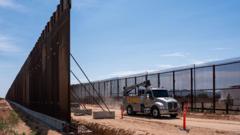The new measures, effective September 1, aim to enhance trade relations while preserving some levies on key industries.
**Canada Eases Trade Tensions with the US by Lifting Select Tariffs**

**Canada Eases Trade Tensions with the US by Lifting Select Tariffs**
Canada's Prime Minister announces reductions in retaliatory tariffs amidst ongoing trade discussions with the United States.
Canada is taking significant steps to alleviate trade tensions with the United States by reducing some of its retaliatory tariffs, as announced by Prime Minister Mark Carney. This decision comes following a recent phone conversation between Carney and President Donald Trump, marking their first direct communication since the two countries missed a crucial deadline to finalize a trade agreement.
Effective September 1, Canada intends to lift certain tariffs on US goods, impacting approximately C$30 billion ($21.7 billion) worth of products such as washing machines and orange juice. However, tariffs imposed on autos, steel, and aluminum will remain unchanged. The move is aimed at aligning Canada's trade policies with the US-Mexico-Canada free trade agreement (USMCA), which Carney described as a mechanism to "re-establish free trade for the vast majority" of goods.
Despite the decision to scale back some tariffs, the Canadian public remains supportive of protective measures against US trade policies. Interestingly, Carney's political opponent, Conservative leader Pierre Poilievre, criticized this move, dubbing it a "capitulation." In response to concerns surrounding the current trade climate, Carney emphasized that Canada's tariff structure is advantageous compared to other nations, with an effective tariff rate of approximately 5.6%, significantly lower than the global average of 16%.
The ongoing trade negotiations will focus on unresolved issues pertaining to key sectors, particularly autos, steel, aluminum, and lumber, ahead of a scheduled USMCA review next year. Economists have raised alarms over the disruptive impact of the US tariffs on Canadian steel and aluminum imports, which play a critical role in the intertwined North American auto manufacturing sector. Reports indicate that the province of Ontario, a manufacturing hub, has already shed 38,000 jobs over the past three months, with many positions being lost in the automotive industry due to these trade challenges.
As trade discussions advance, both countries will need to navigate complex economic landscapes and political sentiments to foster more robust and beneficial trade relations for all parties involved.
Effective September 1, Canada intends to lift certain tariffs on US goods, impacting approximately C$30 billion ($21.7 billion) worth of products such as washing machines and orange juice. However, tariffs imposed on autos, steel, and aluminum will remain unchanged. The move is aimed at aligning Canada's trade policies with the US-Mexico-Canada free trade agreement (USMCA), which Carney described as a mechanism to "re-establish free trade for the vast majority" of goods.
Despite the decision to scale back some tariffs, the Canadian public remains supportive of protective measures against US trade policies. Interestingly, Carney's political opponent, Conservative leader Pierre Poilievre, criticized this move, dubbing it a "capitulation." In response to concerns surrounding the current trade climate, Carney emphasized that Canada's tariff structure is advantageous compared to other nations, with an effective tariff rate of approximately 5.6%, significantly lower than the global average of 16%.
The ongoing trade negotiations will focus on unresolved issues pertaining to key sectors, particularly autos, steel, aluminum, and lumber, ahead of a scheduled USMCA review next year. Economists have raised alarms over the disruptive impact of the US tariffs on Canadian steel and aluminum imports, which play a critical role in the intertwined North American auto manufacturing sector. Reports indicate that the province of Ontario, a manufacturing hub, has already shed 38,000 jobs over the past three months, with many positions being lost in the automotive industry due to these trade challenges.
As trade discussions advance, both countries will need to navigate complex economic landscapes and political sentiments to foster more robust and beneficial trade relations for all parties involved.




















